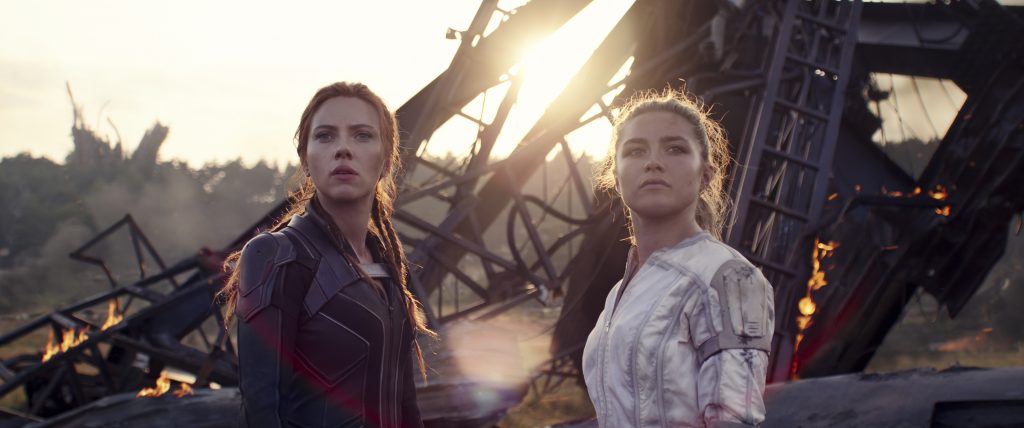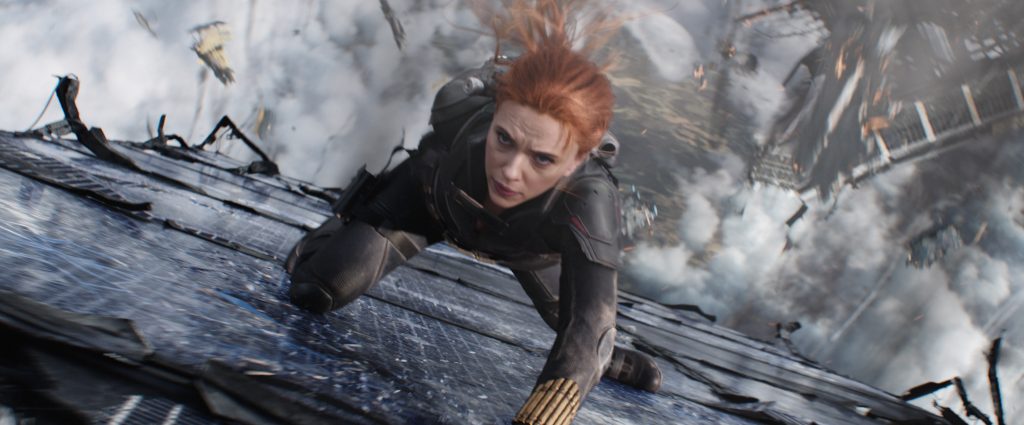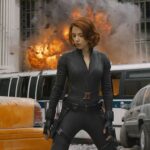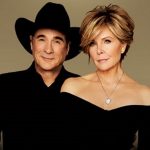Rebecca’s Take
With its release pushed back a year due to the coronavirus pandemic, “Black Widow” has been a long time in the making. I’ve been waiting for the Marvel Cinematic Universe’s first standalone movie starring Scarlett Johansson’s savvy superspy and Avenger since Natasha Romanoff made her electrifying debut in 2010’s “Iron Man 2.” What has been a one-year wait for most people has been more like 11 years for me.
And the wait was worth it. In Marvel’s first new movie in two years, Johansson’s fan-favorite superhero gets the spotlight she deserves. “Black Widow,” available in theaters and on Disney Plus, is unlike any other Marvel movie. The gritty, action-heavy spy film features a female-empowered story at its core.
The 24th film in the MCU catches up with Natasha in between 2016’s “Captain America: Civil War” and 2018’s “Avengers: Infinity War.” After the events of “Civil War,” Black Widow is on the run as a fugitive in Europe. As she tries to lay low, the spy is brought back from the cold when she is forced to confront her past traumas and a mysterious masked villain, the Taskmaster. Natasha must reunite with her original family – sister Yelena Belova (Florence Pugh), a fellow spy; father Alexei (David Harbour), Russia’s only super soldier, the Red Guardian; and mother Melina (Rachel Weisz) – in a bid to atone for some of the red in her ledger.
“Black Widow” succeeds as both a backstory for Natasha and a solo adventure for the character without the other Avengers. With the character dying in 2019’s “Avengers: Endgame,” “Black Widow” fills in several gaps in the spy’s origins and development. It starts out focusing on Natasha’s childhood, which is the earliest we’ve seen of her life apart from flashbacks in 2015’s “Avengers: Age of Ultron.”
The harrowing images of Natasha’s early training during the opening titles, set to a haunting, slowed-down cover of Nirvana’s “Smells Like Teen Spirit” by Malia J, are some of the darkest we’ve seen in the MCU. Longtime fans will finally learn what happened in the oft-mentioned Budapest mission. But the film capably straddles the line between its heavy themes and the trademark humor that dots Marvel’s films. Natasha may have been born from a dark place, but she doesn’t have to stay there.
In her eighth time playing the ever-resourceful Avenger, Johansson finds new avenues to explore. In Black Widow’s previous appearances, the hardened but good-hearted Natasha developed gradually as a supporting character. Now, “Black Widow” gives its lead character the tools to face the traumatic events that shaped her during a particularly vulnerable time in the spy’s life.
Always in control, Johansson has come out on top in her action scenes throughout the MCU, starting with her stunning hallway fight in “Iron Man 2,” her stealthy command of the opening interrogation in 2012’s “The Avengers” and her impersonation of a government official in 2014’s “Captain America: The Winter Soldier.” But “Black Widow” sees the fugitive stricken repeatedly and knocked down in one fight after another. Seeing Natasha endure the hits reminds us that unlike Thor, the Hulk and Captain America, Black Widow is a human superhero, not one powered by a god’s invincibility or a super serum. Unlike Tony Stark or Hawkeye, she doesn’t have a metal suit of armor or a bow and arrow to protect her. This makes Natasha more relatable to viewers and adds to her character development. As the serious but truth-seeking spy, Johansson does a marvelous job of tackling her character’s inner demons. She’s the steady center that keeps the film together.
Besides being a comic book film, “Black Widow” marks Marvel’s foray into the spy genre. The film winks at the audience when Natasha mouths along to the lines of a James Bond film. But the movie cleverly subverts the largely male-dominated genre. Led by the MCU’s first female superhero, “Black Widow” is a story about the liberation of women from a system that has been suppressing them for decades. The film doesn’t hit viewers over the head with its feminist message, but it’s there, wrapped up in a tension-filled, adrenaline-fueled espionage flick.
As the first woman to solely direct an MCU film, director Cate Shortland impresses in helming the female-fronted story. “Black Widow” features several eye-popping action scenes that feature women fighting women or women fighting alongside women. Johansson and Pugh, a newcomer to the action scene, engage in breathless hand-by-hand combat, piloting various crafts and dodging explosions. Shortland shows Johansson and Pugh’s faces in close-up throughout their fight sequences, tracing the progression of the pair’s fractured relationship. Shortland’s involvement highlights how important it is for women’s stories to be told by women.
Though “Black Widow” features plenty of heart-pumping action sequences, the set pieces aren’t as memorable as the MCU’s greatest action masterpiece, “Captain America: The Winter Soldier.” In one of its most creative sequences, “Black Widow” showcases a prison escape that involves a jaw-dropping avalanche. The climactic battle brings together plenty of one-on-one fights and big blasts in an exciting finale. But some of the battles are oddly filmed. There’s one between Harbour’s Red Guardian and the Taskmaster where the camera keeps cutting away, lessening my investment in the skirmish. There’s also some distracting shaky cam and quick cuts.
Having “Black Widow” come out after Natasha’s death in “Endgame” proves problematic because the film must set up a possible successor. This means “Black Widow” isn’t just Johansson’s show, but also Pugh’s. The “Midsommar” and “Little Women” actress is fantastic as the bitter, sarcastic and funny spy Yelena. Revealing her action and comedic sides, Pugh makes a worthy counterpart to Johansson, showing she’s capable of taking over Black Widow’s mantle. But her standout performance threatens to steal the movie from its titular star.
Harbour adds to the fun as the hilarious Red Guardian, longing to revisit his glory days. The actor is a welcome addition to the MCU. It’s fun to see Weisz in a more action-oriented role, harkening to her days in “The Mummy” movies. However, her character is underwritten and inconsistent.
After being delayed by the pandemic, “Black Widow” marks the MCU’s glorious return to the movie theater. Taking over a decade to become reality, the film spins an excellent showcase around Johansson’s enigmatic superhero, finally getting her time to shine. The suspenseful and gripping spy flick delivers solid action with a feminist message. If this is Johansson’s last hurrah in the role, it’s a powerful way to go out. And if this is just the beginning for Pugh, then here’s a warm welcome to the MCU.
4 out of 5 stars

This image released by Marvel Studios shows Scarlett Johansson, left, and Florence Pugh in a scene from “Black Widow.” (Marvel Studios-Disney via AP)
Joe’s Take
Believe it or not, it’s been two years since the last Marvel Cinematic Universe film. Marvel gave fans three Disney Plus shows (“WandaVision,” “Falcon and the Winter Soldier” and “Loki”) in the meantime. However, after giving audiences three films a year in 2017, 2018, 2019, the studio’s last film, “Spider-Man: Far From Home,” was released July 2, 2019. The coronavirus pandemic put the juggernaut franchise on hold. Finally, 11 years after her character’s introduction, the studio released “Black Widow.”
The film opens with a young Natasha Romanoff, played by Ever Anderson (daughter of Milla Jovovich and Paul W.S. Anderson), and a young Yelena Belova (Violet McGraw) living a normal life with their mother Melinda (Rachel Weisz) and father Alexei (David Harbour). Their world is turned upside down when Alexei reveals he’s a Russian operative and they have to leave the country immediately. The thrilling scene combined with the chilling opening credits complemented by a cover of Nirvana’s “Smells Like Teen Spirit” prove a perfect start. Anderson is excellent as a young Natasha, showing seeds of the character audiences came to know and love. It looks like she learned from her mother, an action star best known for the “Resident Evil” franchise.
The film then fast-forwards to the present day of the movie, which on the MCU timeline is after “Captain America: Civil War” and before “Spider-Man: Homecoming.” Natasha/Black Widow (now Scarlett Johansson) is on the run from Secretary Ross (William Hurt) because she is in violation of the Sokovia Accords. However, she runs into more chaos that brings her back to her sister Yelena (now Florence Pugh), her parents and her past. The family must reunite to stop leader of the Red Room Dreykov (Ray Winstone) from kidnapping young girls and chemically brainwashing them to become superassassins and do his bidding under his control.
Marvel adds to its history of phenomenal casting with the addition of Pugh. The actress put herself on the map in 2019 with her roles in “Midsommar” and “Little Women,” where she earned an Oscar nomination for her supporting role. In “Black Widow,” Pugh proved she can star in an action franchise. She’s able to handle the physicality, humor and emotion of the role. Expect to see a lot of her over the next 20 years.
The character Black Widow gets better and better with every movie and Johansson once again thrives in the role. This is a character the writers had to work at, because in 2010’s “Iron Man 2” Johansson didn’t have much to work with. As the movies progressed, the writing gave Johansson the opportunity to use her full range of talents. She already has been a star for years, and is somehow one of the most underrated actresses of the past decade. She just proved again why she belongs among the best action stars in cinema history. The only disappointment about her in the film is that we won’t see her anymore … allegedly. I’d be perfectly OK if they brought her back from her death in “Avengers: Endgame.”
Harbour and Weisz are great actors as well. Harbour plays his role perfectly and blends the humor very well. Weisz shows her range, as her character changes from the beginning of the film.
The story is solid and doesn’t beat the audience over the head with a message. Female superhero movies are finally coming to the forefront. 2017’s “Wonder Woman” proved a female can lead a superhero franchise with the empowering No Man’s Land scene. After the underwhelming “Captain Marvel,” “Black Widow” normalizes female leads in prominent superhero franchises. That’s a huge step for women in film. Even though the plot is about liberating women from a disgusting man, the film never felt like it was trying to prove anything because we already know women belong in these roles.
It doesn’t pull punches either … literally. One thing the best action movies or series have is they show their main characters’ vulnerability, humanity and ability to get back up when they’ve been absolutely beaten up in a fight. The “Daredevil” Netflix series handles this the best as the title character always takes punches, showing his vulnerability and humanity, but also his will to win. Black Widow is brutally punched, and I’ll admit it’s jarring and uncomfortable to watch because we don’t usually see her take that much punishment and we don’t usually see women take that much punishment. However, it showed her strength, courage and ability to overcome brutal body blows. That adds so much to the character, and makes her more relatable. 2017’s “Atomic Blonde” does the same thing effectively, especially during a one-take stairwell sequence where star Charlize Theron is a force, but she takes a lot of punishment. It keeps the audience on the edge of its seat as her life is believably at stake. Films should never pull punches because showing the brutality adds to the reality of the movie.
Eric Pearson, one of the writers for “Thor: Ragnarok,” does a nice job balancing the emotion with humor. Cate Shortland is also strong in the director’s chair. The action sequences are solid for the most part. Some scenes have too many cuts and other MCU movies have better action. What I appreciated most about the action was it did a nice job showing the force behind everyone’s kicks, punches and headbutts. You can feel it in the audience.
The film could have shown more about what happens to the girls after they are kidnapped by Red Room and turned into Widows. The film is 2 hours and 14 minutes, so it didn’t have a ton of wiggle room to add things, but the movie was good enough to bump it to two and a half hours. Also, some in the film make unrealistically quick character turns. Furthermore, while Winstone does his job as the villain, there’s not really much to the character. He’s just pure evil.
My biggest problem with the film is not the film itself. It’s the studio taking 11 years to get this film released. Marvel was a pioneer for superhero films, making them some of the most successful movies of all-time when audiences thought comic book franchises couldn’t possibly be sustained. The studio had an awesome female character and failed to center a film on her for 11 years, waiting for the DCEU to prove women can lead successful franchises. That’s when Marvel finally gave “Captain Marvel” a green light and that’s when it kicked the tires on “Black Widow.” It’ll always baffle me why it didn’t want to be the pioneer in that as well.
“Black Widow” gives audiences the long-overdue film that should have at least been made five years ago. The MCU movie didn’t pull its punches, added more great characters and actors and gave Johansson the proper sendoff. Like all good MCU films, it nicely blends action, humor and heart. Here’s to many more years of the greatest franchise ever created.
4 out of 5 stars

Rebecca Kivak and Joe Baress write about movies for Take 2 blog. Together, they review current flicks and offer their insights into the latest movie news. Rebecca is a copy editor and page designer at The Times-Tribune. She started her career with Times-Shamrock Newspapers in 2005 and has won several professional journalism awards for page design and headline writing. She also covers NASCAR races from Pocono Raceway. Contact: rkivak@timesshamrock.com; 570-348-9100 x5126; @TTRebeccaKivak




